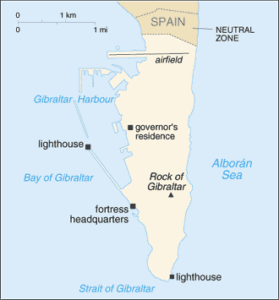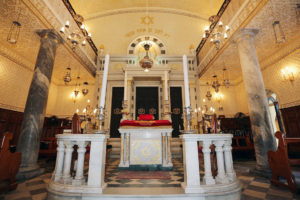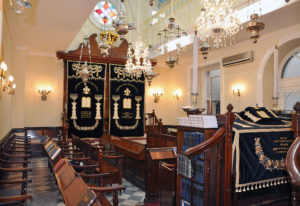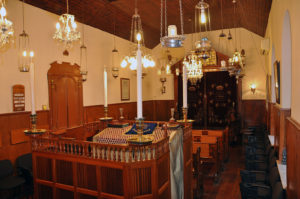 There was a Jewish presence as early as the 14th century. Many of the Jews expelled from Spain in 1492 passed through Gibraltar en route to North Africa. However, Jews returned to The Rock only in 1704, after an Anglo-Dutch force took possession of the fortress. When Spain signed the Treaty of Utrecht in 1713, ceding the fortress to England, it stipulated that no Jews could live there. Yet, in 1729, England allowed Jewish traders from Morocco to visit. Soon after, a community was established, and in 1749, Jews won the legal right of residence. The 600 Jews then made up one-third of the population and played a visible role in public life and trade with Morocco and England.
There was a Jewish presence as early as the 14th century. Many of the Jews expelled from Spain in 1492 passed through Gibraltar en route to North Africa. However, Jews returned to The Rock only in 1704, after an Anglo-Dutch force took possession of the fortress. When Spain signed the Treaty of Utrecht in 1713, ceding the fortress to England, it stipulated that no Jews could live there. Yet, in 1729, England allowed Jewish traders from Morocco to visit. Soon after, a community was established, and in 1749, Jews won the legal right of residence. The 600 Jews then made up one-third of the population and played a visible role in public life and trade with Morocco and England.
 In 1726 Spain claimed that Britain had violated the Treaty of 1713, because she had permitted Jews, enemies of the Catholic religion, to reside in the city. This claim became a pretext for Spain’s attack on Gibraltar, a siege that lasted from 1726 to 1727. During this time, many Jews fled to London. But by 1805, Jews made up half the citizenry. In 1878, there were 1,533 Jews and they controlled most retail trade.
In 1726 Spain claimed that Britain had violated the Treaty of 1713, because she had permitted Jews, enemies of the Catholic religion, to reside in the city. This claim became a pretext for Spain’s attack on Gibraltar, a siege that lasted from 1726 to 1727. During this time, many Jews fled to London. But by 1805, Jews made up half the citizenry. In 1878, there were 1,533 Jews and they controlled most retail trade.
A number of synagogues were built: Nefutsot Yehuda Synagogue founded in 1781; Etz Chayim Synagogue (Little Synagogue), founded in 1781; Abudarham founded in 1820; and Shaar Hashamayim Synagogue founded in 1912.
 During World War II, Jews left Gibraltar along with most of the civilian population, when the Allies used Gibraltar as a base of operations. Some Jews opted to stay in the United Kingdom, but most returned. Gibraltar is home to a Talmud Torah, which educates children through eighth grade, separate boys and girls high schools, as well as a small post-high school yeshiva.
During World War II, Jews left Gibraltar along with most of the civilian population, when the Allies used Gibraltar as a base of operations. Some Jews opted to stay in the United Kingdom, but most returned. Gibraltar is home to a Talmud Torah, which educates children through eighth grade, separate boys and girls high schools, as well as a small post-high school yeshiva.
Today, the Jewish community of Gibraltar is again growing, numbering now 750. It has seen a near 25% increase between 2008 and 2011. Almost the entire community is Sephardim, Jews of Spanish descent, who originally came from the settlers of Tetouan on the northern coast of Morocco. Shabbat, is observed in the city centre, with all Jewish-owned shops closed to patrons.
 Languages spoken in the Jewish community include English, Spanish, Ladino (spoken by the large Sephardic population) and Arabic (traditionally spoken by some of the population which traces its origins back to Morocco). Llanito, the vernacular language for the majority of Gibraltarians, has significant Jewish influence.
Languages spoken in the Jewish community include English, Spanish, Ladino (spoken by the large Sephardic population) and Arabic (traditionally spoken by some of the population which traces its origins back to Morocco). Llanito, the vernacular language for the majority of Gibraltarians, has significant Jewish influence.
Some 500 words are of Hebrew origin, and the language also has features of influence from Haketia, a Judeo-Spanish language spoken by the Sephardic communities of Northern Morocco and the Spanish exclaves of Ceuta and Melilla. The Jews of Gibraltar are the only Jewish community to sing the British anthem in Hebrew, asking not only for the Queen to be saved, but also her husband.